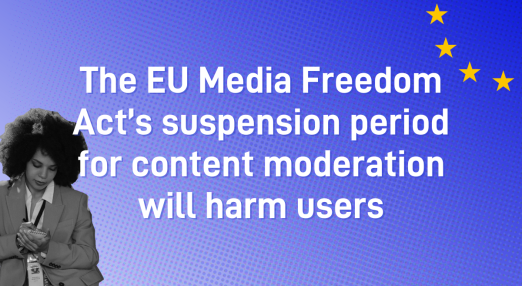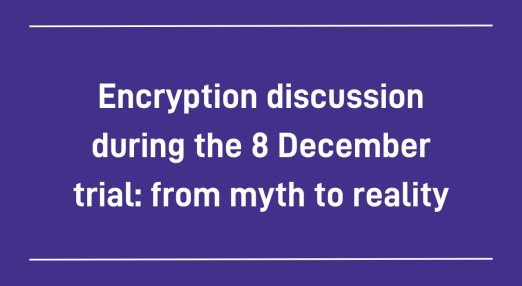Our work
EDRi is the biggest European network defending rights and freedoms online. We work to to challenge private and state actors who abuse their power to control or manipulate the public. We do so by advocating for robust and enforced laws, informing and mobilising people, promoting a healthy and accountable technology market, and building a movement of organisations and individuals committed to digital rights and freedoms in a connected world.
Filter resources
-

The EU Media Freedom Act’s suspension period for content moderation will harm users
In December 2023, the European Parliament and Member States’ representatives negotiated a controversial special status for media outlets in the European Media Freedom Act (EMFA): their content cannot be removed from big tech platforms for up to 24 hours, even when it violates community standards intended to protect users.
Read more
-

Encryption discussion during the 8 December trial: from myth to reality
The defendents’ fundamental right to privacy was treated flippantly and shown little interest by the judges and prosecution of the Paris criminal court in the ‘8 December’ trial hearings. This is a cause for concern and could lead to the justification of police’s ever-increasing surveillance.
Read more
-

Portugal: New data retention law fails at the Constitutional court; Parliament will try for a third time
The Portuguese Constitutional Court has declared a new data retention law proposal to be unconstitutional. In response to the decision, the Parliament swiftly approved, in the beginning of the year, another dubious data retention regime, which might face the same fate - for the third time.
Read more
-

Challenges ahead: European Media Freedom Act falls short in safeguarding journalists and EU fundamental values
The European Media Freedom Act (EMFA) culminated in a politically pressured final trilogue on 15 December 2023. Unfortunately, the agreed-upon text lacks crucial safeguards against surveillance of journalists, which dangerously promote the use of spyware in the EU. It alsoraises concerns about Article 17 and the “media exemption”, potentially undermining the Digital Services Act (DSA) provisions.
Read more
-

EDRi-gram, 17 January 2024
In December 2023, European Union (EU) institutions reached an agreement on the landmark Artificial Intelligence (AI) Act. But we think it might be too early to celebrate. Same for the European Media Freedom Act, which culminated in a politically pressured final trilogue in December. The final text leaves much to be desired in protecting journalists and EU fundamental rights.
Read more
-

The right to pay in cash? Approaches of European countries mapped
The Czech organisation Iuridicum Remedium (IuRe), an EDRi member, has been working for several years on the issue of digital exclusion, which also concerns payment in cash. They discovered that People in the Czech Republic who prefer to pay in cash have been facing problems using some services. Now, IuRe has analysed the approaches of different countries in Europe towards cash payments in a new study.
Read more
-

European Commission discusses “Going Dark”: Behind closed doors
EDRi and 20 organisations call on the High Level Group on Access to Data for Effective Law Enforcement for greater transparency and participation of all stakeholders.
Read more
-

2023: A good year for privacy, a bad year for chat control
With 2023 coming to a close, where does that leave the draft EU Child Sexual Abuse (CSA) Regulation?
Read more
-

Transitioning from 9 years of EDRi policy work
On 12 January 2024, I will step down as EDRi’s Head of Policy after 9 years dedicated to the protection of human rights in the digital age.
Read more
-

EU AI Act: Deal reached, but too soon to celebrate
On 8 December 2023, following over 36 hours of negotiations, EU lawmakers finally cinched a deal on the Artificial Intelligence Act. However, whilst some fundamental rights protections have been won, the overall Act has not lived up to its potential to put people and their rights front and center.
Read more
-

NGOs and experts warn AI Act negotiators: don’t trade our rights!
On 8 December 2023, 70 civil society groups and 34 expert individuals sent an urgent letter to the Council of EU Member States, the European Commission and the European Parliament to urge them "Do not trade away our rights!" in the final trilogue (negotiation) on the landmark Artificial Intelligence (AI) Act.
Read more
-

EDRi-gram, 6 December 2023
In this edition, we reflect on how our movement of human rights organisations and supporters influenced the European Parliament to reject the mass scanning of private messages in the CSA Regulation. And as we approach the final negotiations on the Artificial Intelligence (AI) Act, we are raising the voices of 16 organisations, calling on the Council to effectively regulate the use of AI systems by law enforcement, migration control, and national security authorities in the law. Read on to learn more about digital exclusion in Europe, the expansion of the EURODAC database, and the EU's plans for facial recognition.
Read more
